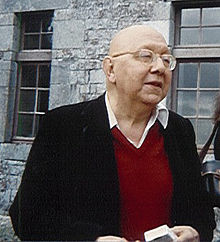| Cornelius Castoriadis |
 |
| Born |
(1922-03-11)March 11, 1922
Constantinople, Ottoman Empire (present-day Istanbul, Turkey)
|
| Died |
December 26, 1997(1997-12-26) (aged 75)
Paris, France
|
| Nationality |
Greek-French
|
| Other names |
"Pierre Chaulieu," "Paul Cardan," "Jean-Marc Coudray" |
| Education |
8th Gymnasium of Athens |
| Alma mater |
University of Athens (1937–1942; BA, 1942)
University of Paris (Dr. cand., 1946–1948)
University of Nanterre (DrE, 1980) |
| Notable work |
List
-
-
The Imaginary Institution of Society (1975)
-
Crossroads in the Labyrinth (1978–1999, 6 vols.)
|
| Spouse(s) |
List
-
- Catherine May
(m. unkn.–unkn.; divorced)
-
Piera Aulagnier
(m. 1968–1984; divorced)
- Zoe Christofidi
(m. unkn.–1997; his death)
|
|
| Era |
20th-century philosophy |
| Region |
Western Philosophy |
| School |
|
| Institutions |
École des hautes études en sciences sociales |
|
Main interests
|
|
|
Notable ideas
|
List
- the Project of Autonomy,
the radical imaginary underlying social institutions,
radical imagination,
the social imaginary, social imaginary significations,
proto-representation (Ur-Vorstellung), the monadic core of the psyche, "the unconscious exists only as an indissociably representative/affective/intentional ,"
rejecting the reduction of representation to perception,
"the first of the drive in the psyche is the affect," the psyche and the anonymous collective are irreducible to each other, sublimation as the process by means of which the psyche is forced to replace its private objects of cathexis with objects that have value through their social institution, social fabrication of the individual, of investments (labilité des investissements), identifying representational activity as prior to reflection,being-in-itself as creative of its own proper world,
idiogenesis/, the world as a product of Chaos, ontological magma,
ensemblist-identitarian logic (), the Cantorian definition of 'set' implies the schema of separation, proto-institutions of legein and teukhein,
Wo Ich bin, soll Es auftauchen ("Where Ego is, Id must spring forth"),conflict of desires, the Social-Historical, the method of elucidation (élucidation), circle of creation, the paradox of history, society's the first natural stratum, "creation is ex nihilo, but it is neither in nihilo nor cum nihilo,"
vis formandi,radical alterity (altérité radicale), time as creation/destruction of forms,societas instituans/societas instituta, plan factory,democratic planning, abolishing the differentiation of revenues,totalitarian (Soviet) vs. fragmented (Western) bureaucratic capitalism, the "final" contradiction of capitalism, relatively autonomous evolution of technique,liberal oligarchy, pseudo-rational , the nomos–physis distinction, three spheres of social action (oikos––), criticism of structuralism (logicism) and functionalism (physicalism), criticism of spiritualist and materialist dialectic, criticism of Marxian economics, criticism of Marx's theory of history, criticism of Lacanianism, criticism of postmodernism
|
Influences
-
Aristotle, Karl Marx, Sigmund Freud, Leon Trotsky, Maurice Merleau-Ponty, Gaston Bachelard, , Paul Ricœur, Hannah Arendt, Susan Isaacs, Melanie Klein, Piera Aulagnier, G. L. Boggs, Rosa Luxemburg, György Lukács, Joan Robinson, C. L. R. James, J. G. Fichte, Martin Heidegger, Edmund Husserl, Max Weber, Jacques Ellul, André Leroi-Gourhan, Jacques Derrida, Giambattista Vico, Jean Laplanche,, Serge Latouche, Francisco Varela
|
Influenced
-
Daniel Cohn-Bendit, Maurice Brinton, Claude Lefort, Takis Fotopoulos, Guy Debord, Jean Baudrillard, Andrew Arato, Hans G. Furth, Hans Joas, Harald Wolf, Edgar Morin, Pierre Vidal-Naquet,, Richard Rorty, Graham Ward, , Vincent Descombes, René Lourau, Shimshon Bichler, Jonathan Nitzan, Robin Hahnel, Marcel Gauchet, , , , , , , Georges Duby, Jacques Le Goff, Nicole Loraux,, Elias Petropoulos, , Lorraine Code, E. P. Thompson, , , Sudipta Kaviraj, John B. Thompson, , Anthony Giddens, Zygmunt Bauman, Theofanis Tasis, Andreas Kalyvas, Nikolas Kompridis, Francisco Varela
|
...

